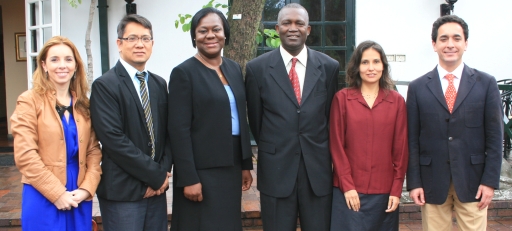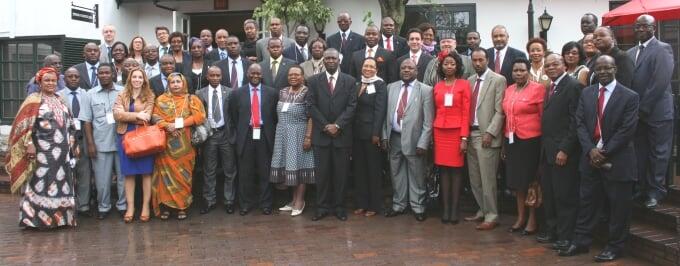The first ever African Parliamentary Forum on Population and Development was established at the Africa Regional Consultative Meeting of Parliamentarians on Population and Development in Johannesburg in December.

- 44 per cent of its population is under age 15, making Africa is the youngest population region in the world.
- Yet youth underemployment and unemployment is a major source of concern.
- The continent has a large number of former child soldiers and other brutalized young men, who have few sources of income or alternative plans for their future.
- Almost 30 million people are infected with, or affected by, HIV and AIDS.
- About 165,000 African women die every year in childbirth.
- Africa has the highest total fertility rates in the world, reaching up to 7.8 children per woman in certain countries.
- Half of the population lives below the poverty line of US$1 a day.
- The number of refugees in Africa is estimated to be 5 million.

At the end of the meeting the MPs, representing 28 African countries, established the Forum to foster better exchange and to coordinate action in support of ICPD beyond 2014. In a declaration, they called on all parliamentary partners and UNFPA to assist in achieving this goal before the end of 2013.
The declaration states that the creation of an enabling environment for poverty reduction and the improvement of the living conditions of the people are prerequisites to the achievement of the MDGs and the objectives of the New Partnership for the Development of Africa (NEPAD). It also took stock of the achievements of the parliamentarians’ networks at the national and regional levels in promoting the ICPD Agenda, with important results in suggesting initiatives in population policies, and harmonization in African legislation on reproductive health and HIV and AIDS.
The Forum was established in a bid to strengthen the capacity of parliamentarians in population and development issues for the implementation and monitoring of the ICPD Programme of Action. It will enable the parliamentarians to meet their commitment to the goals of the ICPD Programme of Action, the MDGs and NEPAD.
An Interim Executive Committee of 10 members was established, comprising two members from each of the five African Geographical sub-regions – central, eastern, northern, southern and western Africa. Once in place, a permanent secretariat of the Forum is to be hosted within a continental, sub-regional or willing national parliament.
The Forum Committee comprises Dr. Chris Baryomunsi (Uganda) as Chair, Marie Rose Nguini Effa (Cameroon) as Vice Chair, and the following as Regional Representatives: Aurélien Simplice Zingas (Central Africa Republic), Highvie Hambulo Hamdudu (Zambia), Thandi Shongwe (Swaziland), Fanta Mantchiny Diarra Epse Sissoko (Mali), Jose Manuel Tavares Sanches (Cape Verde), Ahmed Babou Babah (Mauritania), Mint Mohamed El Moctar El Ezze Mauritania (Tunisia), Betty E. Machangu (Tanzania).
The members issued an urgent call to action. This included the following:
- The ICPD goal of universal access to sexual and reproductive health by 2015 to be used as a target to measure progress towards achieving the MDGs;
- Advocating for the strengthening of the institutional framework for reproductive health, family planning and sexual health by giving more authority to the institutions charged with these issues and by raising their levels in the government administration;
- Urging governments to position population issues within national development frameworks and present them as national priorities;
- Monitoring the observance of good governance, so that the resources allocated to this sector by states and local municipalities are managed with transparency and rigor; striviing to attain at least 10 per cent of national development budgets and development assistance budgets for population and reproductive health programmes, as reaffirmed in the Istanbul Statement of 25 May 2012, Commitment – Keeping Promises – Measuring Results;
- Fostering partnerships with the international community, particularly through North-South and South-South inter-parliamentary cooperation to ensure that commitments made at Cairo concerning resource mobilization are met;
- Advocating for the fulfillment of the agreed target of 0.7 per cent of GNP for official development assistance (ODA);
- Promoting, by proposing laws or any other parliamentary initiatives, legal reforms aimed at improving reproductive health, family planning and sexual health;
- Promoting the reproductive rights of women and adolescents, especially the right to access appropriate service and information on how to prevent unwanted pregnancies, STIs/HIV/AIDS and other infectious diseases;
- Strengthening the fight against AIDS and negative practices including gender discriminatory practices through legislative measures, advocacy, increase of resources and partnership with civil society;
- Supporting the integration of HIV/AIDS programmes with reproductive health programmes and ensure that they are implemented;
- Promoting gender equality, in particular by fighting all forms of discrimination against women and girls;
- Promoting gender equity in all decision-making bodies; and ensuring access to education for women and young girls.
- Strengthening the capacity of the parliamentary networks and committees in the areas of parliamentary initiatives, resource mobilization, advocacy, monitoring of government activities and the running of the secretariat.
Read the declaration in full.


